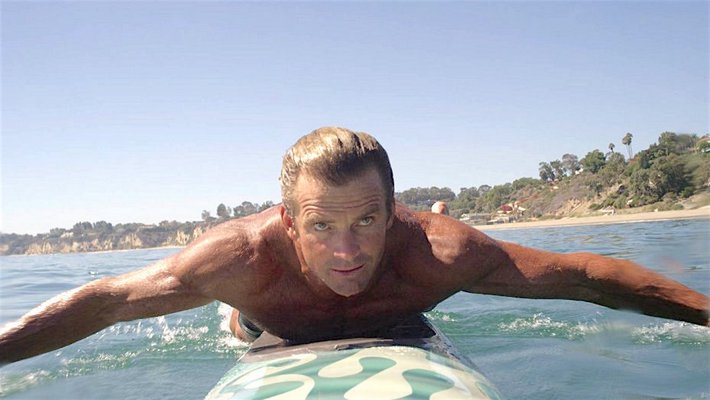
Rebel, pioneer, innovator, individual, celebrity—Laird Hamilton can be described accurately in a great variety of ways, but every unique aspect of his personality finds its truest expression in the ocean.The 52-year-old big-wave surfer is the subject of producer/director Rory Kennedy’s latest documentary, “Take Every Wave: The Life of Laird Hamilton,” which is screening at Gurney’s in Montauk on Friday, August 4, as part of the Hamptons International Film Festival’s Summer Docs series. The film will have its theatrical release in October in New York.
Anyone with even a scant amount of surfing knowledge has heard of Mr. Hamilton, although, unlike other professional surfers who are, or strive to be, household names, his notoriety isn’t derived from winning competitions. Rather, Mr. Hamilton has made a life out of bucking trends—including forgoing a competitive surfing career. It is a habit that began when he was the fiercely rebellious child of a single mother, simply trying to fit in as the only white kid growing up on the North Shore of Oahu in Hawaii.
Mr. Hamilton rose to fame in 1990s, when he and a tight-knit group of friends invented tow-in surfing, using personal watercraft, or Jet-Skis, to be pulled into waves anywhere from 35 to 70 feet tall—a movement that was documented in the 2004 documentary “Riding Giants.” But Ms. Kennedy’s new film focuses the lens on Mr. Hamilton himself, and gives much deeper insight into his life.
A film about a famous surfer is certainly a departure for Ms. Kennedy, a longtime documentary filmmaker and the youngest child of U.S. Senator Bobby Kennedy. She made a name for herself making films centered on heavier fare, including war, poverty and human rights, such as her 2014 film, “Last Days in Vietnam,” which was nominated for an Academy Award.
Ms. Kennedy said last week that before committing to making the film she had met Mr. Hamilton, because they both live, at least part-time, in Malibu, California. It was a mutual friend, Paul Speaker, who suggested that she make a documentary film about Mr. Hamilton, and Ms. Kennedy said her decision to do it was simple.
“I was not so interested in making a surfer film, but I felt that if a great story was there, then I’d be interested,” she said. “I spent a few months developing it and spending more time with Laird, and pretty early on, I was hooked.”
There were several reasons why telling Mr. Hamilton’s story appealed to her, she said. “His childhood, and the fact that this was a kid who came from nothing,” she said. “He had a tough childhood all around and a fraught relationship with his stepfather. And he had a very natural draw to the water that felt almost un-human on some level. I liked that part of the story and that he had come from that and made so much of his life. I also liked the fact that he was such an innovator and changed the sport so profoundly.
“He doesn’t adapt to culture or the norms that surround him,” Ms. Kennedy added. “He’s one of the great individualists. And he surfs these really, really big waves—and that’s just really cool.”
The film gives an in-depth portrait of Mr. Hamilton’s early life, with tales of his renegade behavior as a child and conflicted relationship with his stepfather, Bill Hamilton, and how the ocean became a refuge and an outlet for him at a young age. The film also explores Mr. Hamilton’s fascination with finding new ways to harness and experience the power of the ocean, whether by tow-in surfing, windsurfing or by using a foilboard, a surfboard with a hydrofoil that extends underneath the water and allows the board to leave the water’s surface.
Mr. Hamilton certainly hasn’t been universally beloved by the surfing community over his decades in the water, and even he admitted that for as many ardent fans as he has, there have been plenty of detractors too. But ultimately his place in surfing lore is undeniable, and his story is a compelling one, and, Ms. Kennedy hopes, will leave viewers with something—whether they surf or not—long after they’ve finished watching the film.
“It’s inspiring, I think,” Ms. Kennedy said. “Not to say it should inspire us to surf 70-foot waves, but it should inspire us to work through our fear and do something we haven’t done and take more risk and pursue our dreams a bit more. And pursue the joys and pleasures of life.”